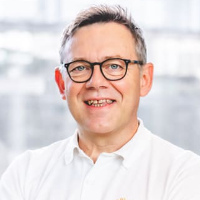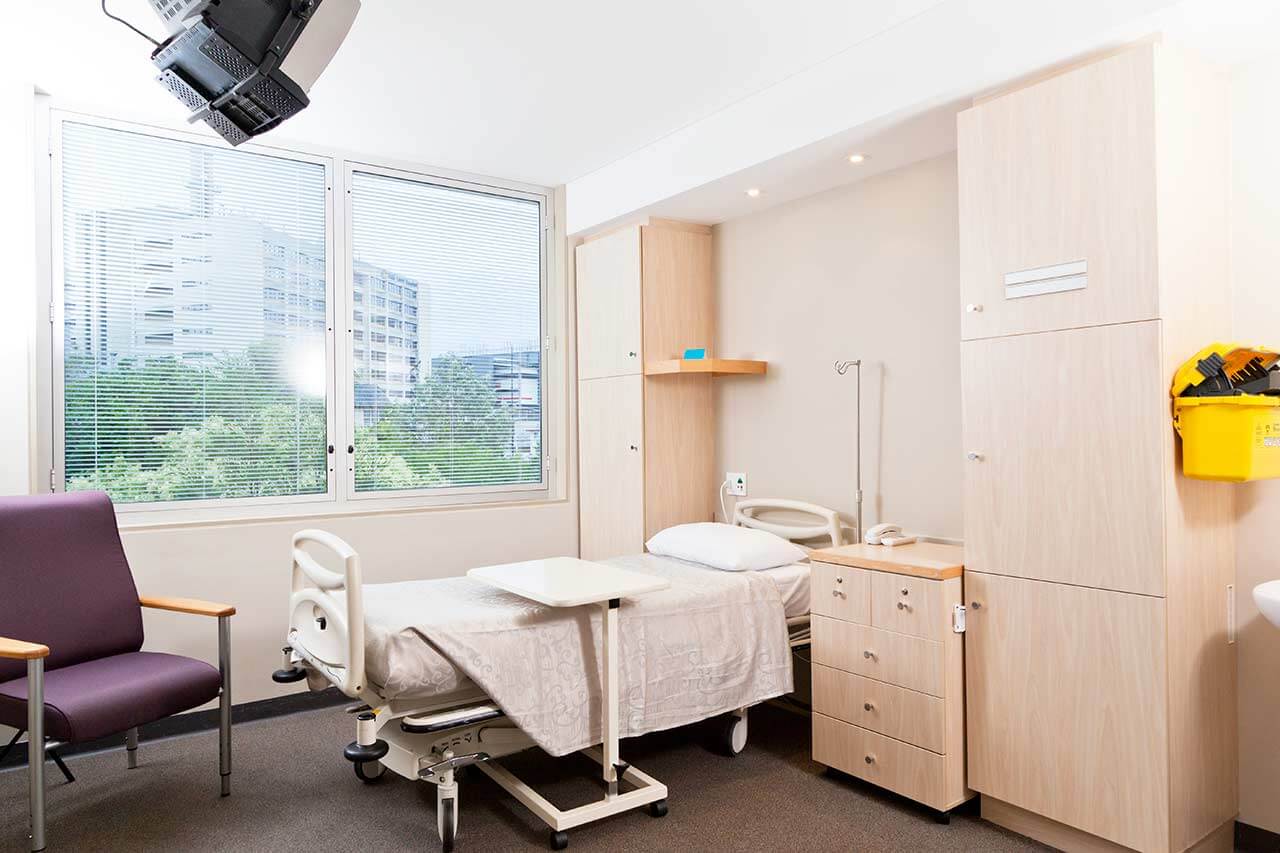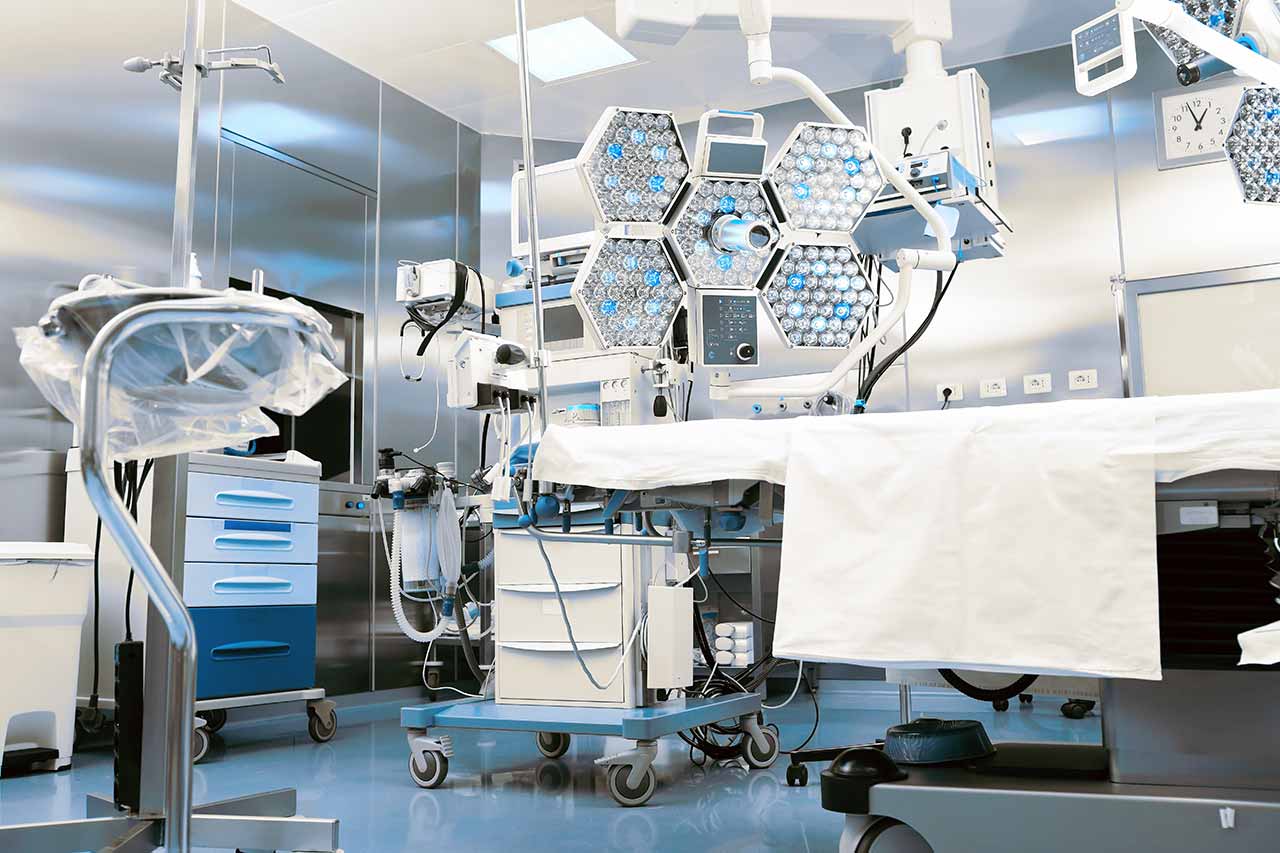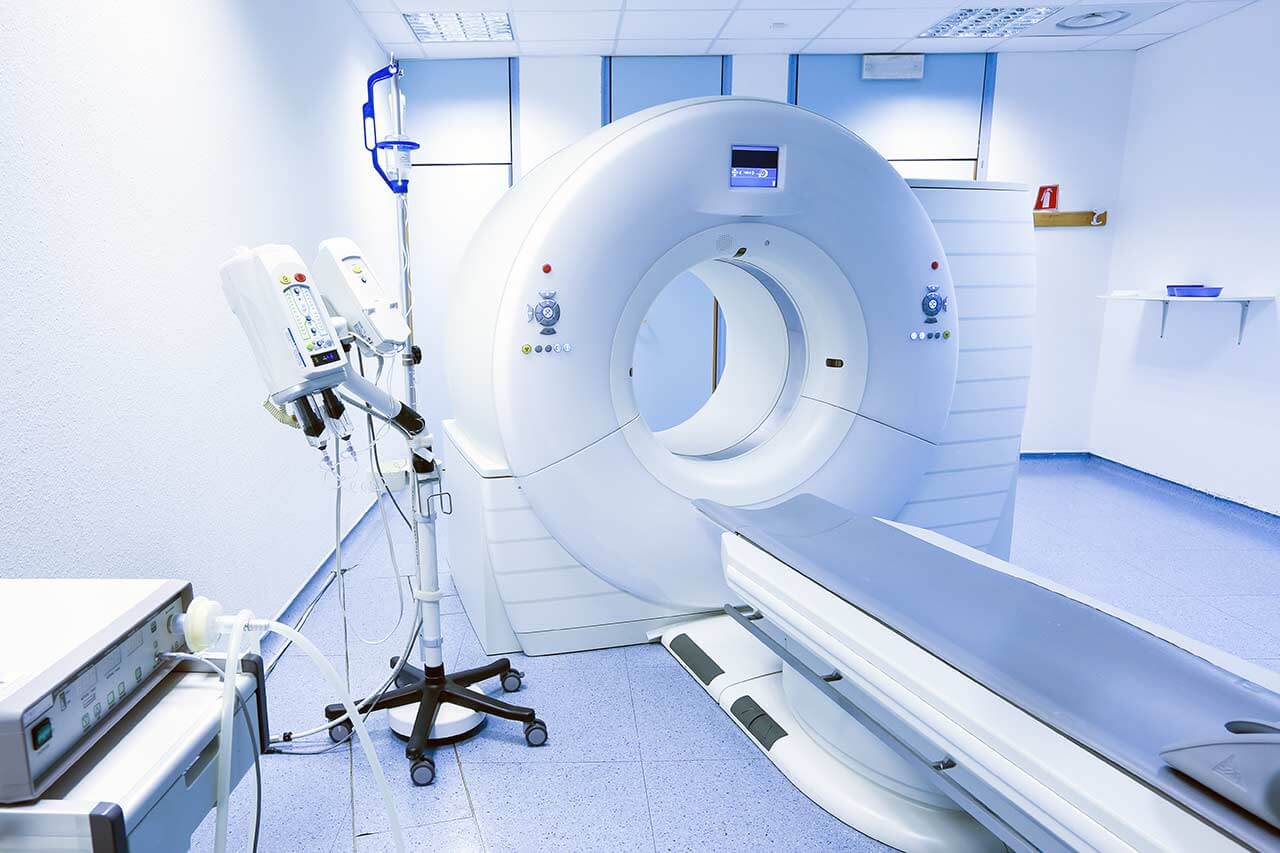
The program includes:
- Initial presentation in the clinic
- clinical history taking
- physical examination
- review of medical records
- laboratory tests:
- complete blood count
- general urine analysis
- biochemical analysis of blood
- indicators of inflammation (CRP, ESR)
- indicators of blood coagulation
- X-ray examination of the knee
- CT scan of the knee
- preoperative care
- endoprosthesis replacement
- symptomatic treatment
- control examinations
- physiotherapeutic procedures
- orthopedic appliances
- the cost of essential medicines and materials
- nursing services
- full hospital accommodation
- explanation of future recommendations
The program includes orthopedic rehabilitation:
- Primary presentation in the clinic
- medical history, including family history
- complex neurological and orthopedic examinations
- X-ray examination
- complex neurophysiological examinations
- individual rehabilitation program, which includes:
- Wii Fit training in the use of the balance
- neuropsychological therapy
- functional therapy of the upper extremities (ArmeoSpring)
- kinesitherapy (physiotherapy)
- biocontrol with feedback
- healing deep muscle massage
- acupuncture of spasticity and pain syndromes
- occupational therapy
- psycho-educational classes
- individual physiotherapy
- microcurrent treatment
- fangotherapy / cryotherapy
- antispasmodic drug therapy
- mobilization of limb joints
- hydrotherapy / massage therapy / reflexology
- training on special trainers
- etc.
- nurses care
- stay in the hospital with full board
- symptomatic and drug therapy
How program is carried out
Preliminary preparation for surgery: quitting smoking and drinking alcohol 2 weeks before surgery; cancelling non-steroidal anti-inflammatory drugs (diclofenac, ibuprofen); cancelling anticoagulants (warfarin); normalization of body mass, if possible.
Preoperative examination, including consultation with an anesthesiologist and necessary related specialists. X-ray examination and MRI of the knee joints are performed. The examination takes 1-2 days.
Surgical knee endoprosthesis replacement. The operation is performed under general anesthesia and lasts for about 2 hours.
Postoperative care. During the first day after the intervention the patient stays in the intensive care unit, under round-the-clock medical supervision. After that, with a smooth course of the postoperative period, the patient is transferred to a regular ward and the drains are removed. The range of motion expands gradually, from light toes movements to walking. Walking with the use of walking aids is allowed in 3-5 days after the operation. Normal walking without the use of walking aids (crutches, cane) will become possible in 6-12 weeks.
Finally, the attending physician will evaluate the results of control examinations, schedule the date of discharge from the hospital and give you detailed recommendations for further follow-up and treatment.
Rehabilitation. The rehabilitation program begins after the transfer of the patient from the intensive care unit to a regular ward. It includes physical activity (from exercises in bed in the early days to exercises in the gym), physiotherapy, massage (including lymphatic drainage). After discharge from the hospital, the patient is transferred to a specialized rehabilitation clinic for 2 weeks, where he undergoes an advanced rehabilitation course.
Required documents
- Medical records
- X-ray examination, MRI/CT scan (if available)
Service
You may also book:
 BookingHealth Price from:
BookingHealth Price from:
About the department
The Department of Adult and Pediatric Orthopedics, Foot Surgery at the Beta Clinic Bonn ranks among the best German medical facilities specializing in hip surgery!
The department treats the full range of musculoskeletal diseases in adults and children. Special attention is paid in the medical facility to the treatment of pathologies of large joints, foot diseases and deformities, and congenital malformations of the musculoskeletal system in children. The department has comprehensive treatment programs for chronic back pain. In addition, stem cell injections are successfully performed here for treating knee and hip arthrosis. The department has an innovative AutoCart technique for cartilage cell transplantation and restoration of cartilage tissue in patients with joint degeneration. Interventional and surgical treatment is complemented by well-chosen conservative therapy, including therapeutic exercises, manual medicine, acupuncture, magnetotherapy, shock wave therapy, and other techniques. The department has advanced equipment adapted for the treatment of orthopedic diseases of any complexity in adults and children. The experience and professional skills of the doctors deserve special attention because, according to ratings based on patient reviews on the Jameda website, the department's three leading doctors enjoy the status of the best orthopedists in Bonn. The department is headed by Dr. med. Peter Braun.
Arthrosis of large joints is one of the most common diseases in orthopedics. The department therefore offers all the options of conservative and surgical treatment for knee, hip, and shoulder arthrosis. At the same time, a special focus is on partial and total joint replacement surgery. Arthroplasty is a surgical intervention to replace a damaged or worn joint with an artificial one. Dr. Braun, the Head Physician of the department, has been performing joint arthroplasty procedures for many years. He can thus successfully select the optimal solution for each patient, taking into account his individual needs. Joint replacement surgery is carried out using minimally invasive techniques, so a hospital stay is relatively short, namely, 5-8 days. In addition, low-traumatic techniques contribute to a lesser severity of pain in the postoperative period. In the course of minimally invasive joint replacement surgery, the department's surgeons manage to maintain the integrity of the muscular and ligamentous apparatus, which ensures the high stability of the prosthesis and a physiological range of motion. It is important for the department's orthopedists to ensure good engraftment of the artificial joint, so they use prostheses from the world's leading manufacturers made of reliable materials (for example, cobalt-chromium or titanium alloys, polymers, ceramics). These materials have excellent compatibility with the human body and a long service life. Following joint replacement surgery, the department offers patients professional rehabilitation, which lasts 2-3 weeks.
The department's doctors keep pace with innovations in medicine, so they offer an advanced treatment method for knee and hip arthrosis using the patient's own stem cells obtained from adipose tissue. In some cases, the method can also be used to treat shoulder and ankle joints. Doctors harvest stem cells, after which they make a stromal-vascular fraction (cellular concentrate). The specialist then administers the obtained biological material into the affected joint by injection, after which the joint tissues begin to regenerate. The procedure is performed under local anesthesia on an outpatient basis. The duration of the procedure is 60-90 minutes. More than 150 patients have already been treated in the department with this method and have received impressive results, including significant pain relief and improved mobility. In some clinical cases, a stem cell transplant can be an excellent alternative to joint replacement surgery.
Another unique offer in the department is the AutoCart procedure, which involves cartilage cell transplantation to restore cartilage. This procedure improves joint function. The AutoCart procedure is quite simple and safe. It consists of two stages: the harvesting of cartilage cells (an arthroscopic technique) and their follow-up transplantation into the affected joint. The AutoCart procedure is highly effective. It slows down degenerative processes in the joint, eliminates pain, and improves mobility.
The department also treats children with orthopedic diseases. Young patients are treated in close cooperation with pediatricians and radiologists. The department's specialists provide medical care to children with hip dysplasia, clubfoot, X- and O-shaped lower limb deformities, unequal leg length, flat feet, scoliosis, and other pathologies. Whenever possible, conservative treatment is carried out. If an operation is unavoidable, the department's specialists strive to perform it using minimally invasive techniques. The department's doctors surround young patients with care and strive to win their trust because it is very important to them that the children feel comfortable and do not experience any fears during the treatment.
The department's main clinical activities include:
- Adult orthopedics
- Conservative treatment
- Manual therapy
- Acupuncture
- Shockwave therapy
- Magnetotherapy
- Thermocoagulation
- Microcurrent therapy
- Intra-articular injections
- Treatment with bandages, orthoses, insoles, etc.
- Therapeutic exercises
- Surgical treatment
- Knee, hip and shoulder replacement surgery
- Partial joint replacement surgery
- Total joint replacement surgery
- Revision joint replacement surgery
- Stem cell transplantation for arthrosis
- Autologous cartilage cell transplantation (AutoCart procedure) arthrosis
- Surgical treatment of chronic back pain
- CT-guided microtherapy
- Minimally invasive interventions
- Arthroscopic surgery
- Knee arthroscopy
- Meniscus resection
- Meniscus suturing
- Arthroscopy for cartilage defects
- Arthroscopy for cruciate ligament injury
- Arthroscopy for knee instability
- Arthroscopy for patellar fracture or dislocation
- Shoulder arthroscopy
- Arthroscopy for shoulder impingement syndrome
- Arthroscopy for rotator cuff tears
- Arthroscopy for shoulder instability
- Arthroscopy for biceps tendonitis
- Arthroscopy for shoulder fractures
- Elbow arthroscopy
- Arthroscopy for free intra-articular bodies
- Arthroscopy for golfer's elbow and tennis elbow
- Arthroscopy for cartilage lesions
- Arthroscopy for distal biceps tendon tears
- Arthroscopy for fractures
- Knee arthroscopy
- Knee, hip and shoulder replacement surgery
- Conservative treatment
- Pediatric orthopedics
- Conservative treatment
- Minimally invasive interventions
- Foot surgery
- Arthroscopic ankle surgery
- Arthroscopy for ankle impingement syndrome
- Arthroscopy for cartilage lesions
- Arthroscopy for torn ligaments
- Arthroscopy for fractures
- Surgical repair for hallux valgus
- Surgical repair for hallux rigidus
- Surgical repair for claw and hammer toes
- Surgical repair for Achilles tendon rupture
- Surgery for exostoses
- Arthroscopic ankle surgery
- Other medical services
Curriculum vitae
Dr. med. Peter Braun studied human medicine at the University of Bonn and has also worked at the Cedars-Sinai Medical Center in Los Angeles (USA) and the Medical Center of the University of California in San Diego, California (USA).
Following the completion of his full education in general surgery and traumatology in Unna and in orthopedics in Dortmund, Germany, he was board certified in orthopedics in 2000.
Since 2001, his activities have been focused on the conservative and surgical treatment of arthritis and orthopedic diseases in children.
From 2005 to 2012, Dr. Peter Braun served as a Senior Surgeon at the Evangelical Hospital Cologne Kalk, Germany, specializing in knee and hip replacement surgery.
Since 2008, he has been a member of the Medical Commission of the German Fencing Federation and a doctor for the National Fencing Team.
In 2013, Dr. Braun headed the Department of Adult and Pediatric Orthopedics, Foot Surgery at the Beta Clinic Bonn, where his priority areas include knee and hip replacement surgery and the treatment of orthopedic diseases in children.
Photo of the doctor: (c) Beta Klinik Service-, Verwaltungs- und Forschungs- GmbH
About hospital
The Beta Clinic Bonn is a modern private healthcare facility with 20 specialized departments. In addition, the clinic cooperates with 30 independent doctors of various specializations, most of whom have their own private practices. The doors of the clinic first opened for patients in 2008. Since that time, the medical facility has expanded significantly and achieved outstanding success. It harmoniously combines state-of-the-art equipment, high levels of competence among doctors, and comfortable infrastructure. All these possibilities make it possible to provide patients with high-quality medical care in accordance with modern European standards. The work of the medical team at the clinic is based on the following principle: "Our task is to take care of the health of patients." The clinic provides comprehensive treatment, taking into account the individual needs and wishes of each patient.
The hospital has an excellent diagnostic base: rooms for instrumental diagnostics, imaging tests, and endoscopic procedures. The medical complex also has in-house laboratories with advanced equipment. The clinic's doctors have the opportunity to perform comprehensive diagnostics in the shortest possible time and detect the slightest pathological changes in the work and structure of the internal organs. When considering the diagnostic results in complex clinical cases, physicians from related specialties are often involved in the process so that all important aspects are taken into account when developing a treatment regimen for a patient.
The therapeutic options at the clinic are quite diverse. At the same time, doctors always strive to keep pace with innovations, carrying out treatment using the most modern and sparing techniques. The operating rooms at the clinic have advanced computer equipment, navigation devices, monitoring systems, surgical microscopes, special tools, and equipment for laparoscopic and endoscopic interventions, as well as laser systems. The clinic also has an in-house Rehabilitation Center, where patients undergo physiotherapy and therapeutic exercises.
The clinic is expanding more and more every year. Innovative developments in diagnostics and treatment are immediately introduced here. It is worth noting that the clinic is a pioneer in Germany in advanced laser treatment for epilepsy. The therapy was implemented into clinical practice in 2019 and has been successfully applied here since then.
Photo: (с) depositphotos
Accommodation in hospital
Patients rooms
The patients of the Beta Clinic Bonn live in comfortable single rooms. Each room has a separate bathroom with a shower and toilet. The rooms have a modern design and meet the standards of a high-class hotel. For the convenience of patients, the rooms are equipped with electrically adjustable beds, air conditioning, satellite and Internet TV, a telephone, and Wi-Fi.
The clinic also offers accommodations in enhanced comfort rooms. Such patient rooms have a more refined design. In addition, they are very spacious. Enhanced comfort rooms have a minibar, daily fresh fruit, and a special dinner menu. Most windows of the clinic's patient rooms offer a beautiful view of the Rhine River and beautiful green landscapes.
Meals and Menus
The patients of the clinic are offered balanced, delicious food: a buffet breakfast, a hearty three-course lunch, and a light dinner. Also, for dinner, one can taste special offers from the chef at the hospital restaurant, which, if desired, can be served to the patient room.
Further details
Standard rooms include:
Accompanying person
Your accompanying person may stay with you in your patient room or at the hotel of your choice during the inpatient program.
Hotel
You may stay at the hotel of your choice during the outpatient program. Our managers will support you for selecting the best option.
In the immediate vicinity of the clinic is the Kameha Grand, a five-star hotel. The exterior and interior of the hotel impress with their beauty. In addition, the hotel is famous for its excellent service. The hotel is located on the banks of the Rhine and offers picturesque views from its windows.





